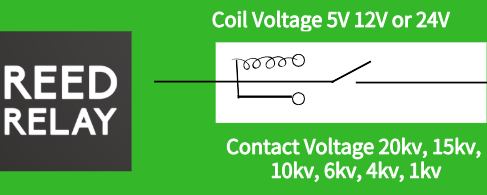Application of Dry Reed Relays in High Voltage Isolation of Electric Vehicles
Currently, high-voltage fast charging has become the preferred choice for the industry. In 2019, Porsche’s Taycan was the first in the world to introduce an 800V high-voltage electrical architecture, equipped with an 800V DC fast charging system and supporting 350kW high-power fast charging. After entering 2021, the high-voltage fast charging route has been increasingly favored by more and more automakers. First, international giants such as Hyundai and Kia released 800V platforms, followed by domestic automakers such as BYD, Great Wall, GAC, and Xiaopeng, who have successively launched or planned to launch 800V platforms. High-voltage fast charging experience will become an important standard for differentiated experience in the electric vehicle market.
Unlike conventional gasoline or diesel-powered vehicles, hybrid and electric vehicles are composed of multiple electrical functional modules to ensure their normal operation. Various hardware control modules, coupled with automotive safety standards, require an internal detection system for all electric vehicles. To ensure that the detection system can better switch or disconnect from the high-voltage system, we need a switching component with high isolation and reliability. Although insulation detection systems can use different types of isolation devices, MiRelay dry reed relays are more suitable for this application.
Dry reed relays have brought significant advantages to insulation measurement of hybrid and electric vehicles. The versatility of this relay enables it to switch stably and repeat every time, and it can handle various power loads and external environments. Unlike semiconductor switches, the internal capacitance of dry reed relays is linear and does not change with temperature, and the internal components do not wear over time. In terms of performance, dry reed relays can accurately measure the isolation voltage while having leakage current within the picoampere range and a fast switching capability of up to 1ms. This ensures millions of reliable operations, of course, depending on the load. If the isolation performance of the electric vehicle deteriorates, dry reed relays can help effectively alert before serious failure.
HVR series dry reed relays withstanding voltage of 4KV/5KV/6KV/10KV/15KV/20KV
● Contact forms: 1A/2A/4A/1C/2C/1B
● Switching voltage up to 10KVDC
● Switching current 3A, pulse current 5A/10A/20A
● Insulation resistance above 10T
● Provide various external dimensions
SIP-HV series dry reed relays The SIP-HV series dry reed relays are fully injection-molded, single-row straight insert high-voltage relays or precision instrument-grade relays that can switch up to 1kVDC and withstand a breakdown voltage of up to 4kVDC. The insulation resistance is greater than 5 x 10^12Ω, and the PCB layout area used is the smallest, only half of the traditional DIP package.
Product features: Coil voltage (VDC): 05, 12, 24 Coil resistance (Ω): 140-2000 Contact form: 1A (SPST)/normally open (N.O.) Maximum rated power: 100W/1000VDC/1A
